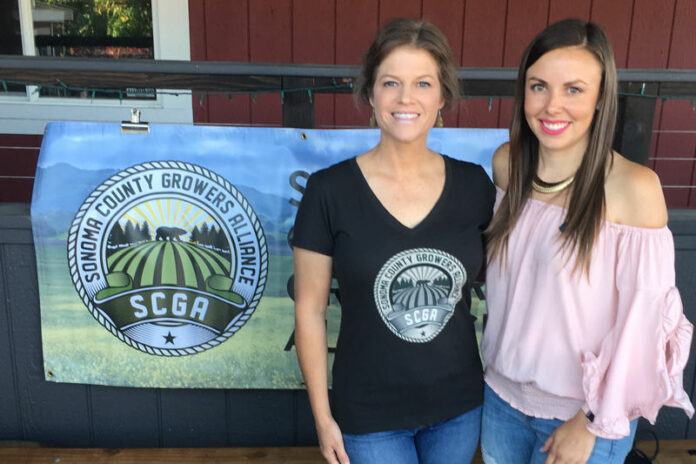Sonoma County is no stranger to cannabis, and the passing of Proposition 64, the Adult Use of Marijuana Act (AUMA), has opened the doors for approved, state-licensed facilities to commercially sell, distribute and produce marijuana for its recreational consumers.
According to the Sonoma County Cannabis Program’s website, businesses that grow or manufacture cannabis products pay a variety of taxes, based on the type of state license their business holds. The qualifications are based on cultivation type (outdoor, indoor or mixed-light cultivation) and supply chain operator type (manufacturer, transporter, distributor, etc.)
At press time, the county had received 207 applications for cannabis permits, but there was no information available about how the taxes are allocated throughout the county.
However, that does not mean cannabis businesses in the area haven’t already been contributing to the community.
The Sonoma County Growers Alliance (SCGA) is a grassroots nonprofit, founded in March 2015 with a mission to ensure that all parties involved in cannabis production, from businesses to regulatory bodies, honor all government and community standards.
“Right now, we’re diving super deep into policy,” said Alexa Wall, board chair of SCGA. “There’s been a lot of neighborhood opposition, so our organization is focused on making sure that the information that’s out there is factual and not scare tactics and propaganda.”
According to Wall, the ability to function as a legal business will give cannabis companies greater ability to expand their efforts to the community.
“Once these businesses are actually able to operate, there’s a big desire from the cannabis community to belong and be accepted and philanthropic,” said Wall. “It’s this hump we have to get over. We have to get our permits, get an operation and then we can contribute.”
These aspirations were put to the test after the historic Sonoma County fires of October 2017, and SCGA turned its monthly mixer into a fire-relief fundraiser with the help of the California Grower’s Association (CGA).
“With the generous help of our sponsors and members of the industry, we were able to raise funds, and we handed them out about a few weeks ago to a couple of different members of SCGA who, without this help, may or may not have been able to pay bills and get equipment,” said Wall.
Their efforts raised over $20,000 for fire relief. According to Wall, other businesses in the area also contributed to the cannabis community in materials. Bio 365, for example, donated pallets of soil to anyone who lost crop, whether they were vegetable gardens or cannabis plants.
Jennifer Michaels, a member of SCGA, was one of the recipients of these funds after losing her farm in the fires.
“I had a 215 (medical cannabis) collective,” Michaels said. “I had about 10,000 patients or members in my collective, and I lost pretty much all of that. I also lost my farm, and I did have the ag department come out and verify that it was a 100 percent crop loss.”
“Unfortunately, when things like this happen in anyone’s life, the bills don’t stop,” said Michaels. “Being a farmer in this industry and putting all your money into something you believe in is already tough enough.”
SCGA was able to give Michaels an $8,000 check to help rebuild her life and business. She hopes to find a potential business partner and start a nursery.
Dennis Hunter, cofounder of CannaCraft, said that the company was able to help American Red Cross (ARC) during the fires.
“We had just taken over about a 15,000 square foot space right next to us, but we hadn’t moved in yet,” said Hunter.
“It was all cubicles, and we reached out to American Red Cross to see if we could get cots and stuff for people to sleep in and turn it into a living quarters for people who lost their homes.”
What Hunter didn’t know at the time was that ARC could not work out of their northern California office because of the fires, and ARC staff had been working out of a small office in San Rafael.
Once realizing that the Santa Rosa office space was empty, ARC asked CannaCraft if they could use it as their headquarters.
“I had to tell them, ‘You know we’re a cannabis company.’ And the guy was like, ‘We don’t care what you do. We need this and we need to get out here and have our headquarters closer to where we can really help people,’” Hunter said.
ARC moved into the building the next day and set up shop.
CannaCraft also supports community projects year-round. The CannaCraft staff, which is made up of about 160 employees, will clean a park in Santa Rosa every quarter.
“Now that (cannabis) is legal, we try to reach out and get out there in the community, be visible and do really cool projects,” said Hunter. “It helps tear down the stigma around cannabis when (people) see companies like ours and others in the industry getting out there and doing things.”
CannaCraft financially supports Daily Acts, a sustainability nonprofit organization based in Sonoma County that implements projects such as turning residential lawns into sustainable gardens.
“(It’s) amazing being in this space right now, being able to be that leader in the cannabis space and really set that example,” said Hunter. “It’s really neat seeing our community thrive in that philanthropic space.”
Ali Ganji, founder and president of Grassroots Brands, is also dedicated to giving back to the community.
“(I have been) a successful entrepreneur since I was 19, living my dream life — cars, traveling and every possession I could have,” said Ganji.
“When I was (living) in Las Vegas, I started walking the streets and giving peanut butter and jelly sandwiches and water to the homeless, and I realized that’s the only thing that made me truly happy.”
Grassroots Brands, a new company in Sonoma County, aims to work with young entrepreneurs as their contract manufacturer, brand consultant, marketing agent and potential investor.
The company is planning to support a local nonprofit by gathering resources to build a garden for a farm-to-table program for youth and supply cancer patients in the area with discounted medical products.
“I spent seven years in insurance-based medicine,” said Ganji. “I don’t call it healthcare anymore, because I believe they’re focused on insurance. That being said, I’m excited to be a member of the community and help as many people as I can.”








